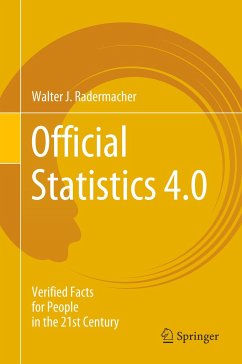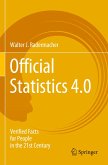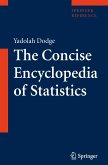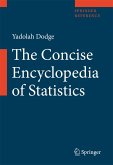This book explores official statistics and their social function in modern societies. Digitisation and globalisation are creating completely new opportunities and risks, a context in which facts (can) play an enormously important part if they are produced with a quality that makes them credible and purpose-specific. In order for this to actually happen, official statistics must continue to actively pursue the modernisation of their working methods.
This book is not about the technical and methodological challenges associated with digitisation and globalisation; rather, it focuses on statistical sociology, which scientifically deals with the peculiarities and pitfalls of governing-by-numbers, and assigns statistics a suitable position in the future informational ecosystem. Further, the book provides a comprehensive overview of modern issues in official statistics, embodied in a historical and conceptual framework that endows it with different and innovative perspectives. Central to this work is the quality of statistical information provided by official statistics. The implementation of the UN Sustainable Development Goals in the form of indicators is another driving force in the search for answers, and is addressed here.
This book will be of interest to a broad readership. The topics of sociology, epistemology, statistical history and the management of production processes, which are important for official statistics and their role in social decision-making processes, are generally not dealt with in statistics books. The book is primary intended for official statisticians, but researchers and advanced students in statistics, economics, sociology and the political sciences will find the book equally stimulating. Last but not least, it offers a valuable source of reflection for policymakers and stakeholders.
This book is not about the technical and methodological challenges associated with digitisation and globalisation; rather, it focuses on statistical sociology, which scientifically deals with the peculiarities and pitfalls of governing-by-numbers, and assigns statistics a suitable position in the future informational ecosystem. Further, the book provides a comprehensive overview of modern issues in official statistics, embodied in a historical and conceptual framework that endows it with different and innovative perspectives. Central to this work is the quality of statistical information provided by official statistics. The implementation of the UN Sustainable Development Goals in the form of indicators is another driving force in the search for answers, and is addressed here.
This book will be of interest to a broad readership. The topics of sociology, epistemology, statistical history and the management of production processes, which are important for official statistics and their role in social decision-making processes, are generally not dealt with in statistics books. The book is primary intended for official statisticians, but researchers and advanced students in statistics, economics, sociology and the political sciences will find the book equally stimulating. Last but not least, it offers a valuable source of reflection for policymakers and stakeholders.
"I highly recommend this book. The topic of official statistics might seem dry and uninteresting to some, but this author provides a unique perspective that students and practitioners will find useful. Plenty of figures, illustrations and flowcharts (in colour) are used to show the concepts. Many references are included at the end of each chapter for those readers who want to delve into the topics in more depth." (Wendy L. Martinez, International Statistical Review, Vol. 89 (3), 2021)








